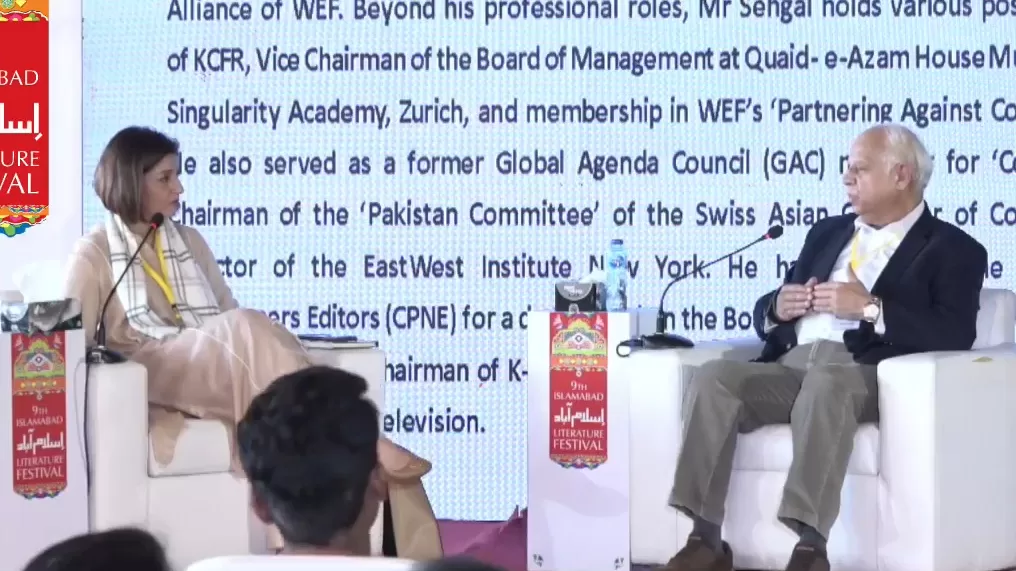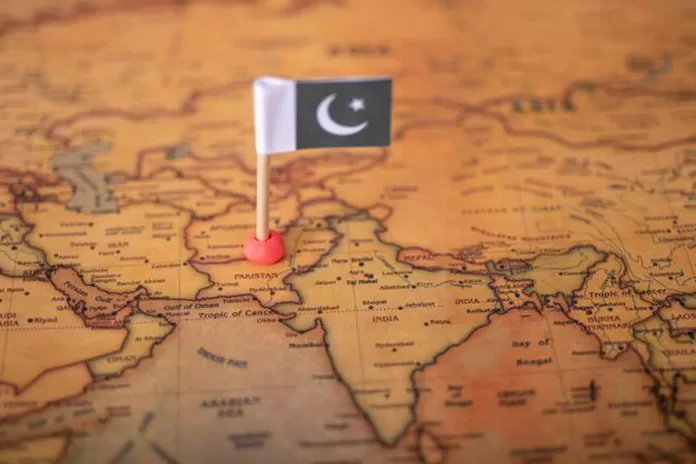Ikram Sehgal:
I would like to share my thoughts on this topic of immense importance, foreign policy and security policy. Huma Baqai introduced the topic by saying, “Pakistan is located in a difficult neighbourhood and the kind of geography that we have had to tackle, which some call a blessing and others now say is baggage. But it’s largely how we navigate our foreign policy and our security policy.”
I would like to emphasize that both geoeconomics and geopolitics are closely intertwined. Unless you consider them together, you’re likely to encounter problems. Let’s address the misunderstanding about geoeconomics and geopolitics. I want to share an experience from 1970 during the cyclone in East Pakistan. While flying a helicopter, I took the governor to one of the islands. Exhausted, I strapped myself in, dozed off, and woke up to the sight of young kids with blue eyes peering into the cockpit. Surprised, I realized they were descendants of the Portuguese, Dutch, Arabs, etc., stranded there since the 16th century due to shipwrecks and piracy. Back then, it was all about geoeconomics until the mid-19th century. And when geopolitics started taking over, when people started making empires, like the British Empire, the Portuguese Empire, etc., then it all changed direction after the Second World War and the interim period.
So, I think if you look at it, geoeconomics, geopolitics, all these things we’ve taken, these things all are related to each other, and they must be taken as such. It’s crucial to recognize their relationship. One may influence the other, but ultimately, the interest of the country in question prevails. The interest of the countries matters the most. Now, what do you think, why does the West invest so much money into India? The answer is because of the vast population. It is economics because they’ve got these multinational companies coming in, bringing in huge amounts. Later, it evolved into geopolitics, playing a role in the containment of China. It’s a dynamic interplay that requires a comprehensive understanding.
I think with India and East Pakistan, and turning to Bangladesh it was pure geopolitics. Like Mushahid Hussain Sayied and all mentioned before, Jawaharlal Nehru said, “This nation is not going to survive 6 months,” and nobody expected this finest experiment of nationhood of its time – East Pakistan was separated by thousand miles – to exist, but I think they were after 1965, when India fought to a standstill in the western borders, and they did nothing about East Pakistan. They could have overrun East Pakistan because there were only four brigades, infantry brigades, they stretched out that thing.
Then they realized it was time to separate the two, and they went about it very methodically. The Ganga hijack, when they made sure that oversight was completely down. At that time there were about 30 flights a day to Dhaka of Pakistan International Airline (PIA) from Lahore, Karachi, from Islamabad, and ultimately, they succeeded in halting these flights now there is not a single flight, and this is a disturbing fact.
So, it was geopolitics. Now, why they’ve gone into geoeconomics is not because of other things, this is all because of China. China is investing so much money into power stations, roads, and other things that India has to play catch up with China so they don’t fall behind. However, let me be very frank, and as mentioned yesterday, there is an inherent tension when these two aspects clash. When geopolitics and geoeconomics rub against each other, it is the predominant national interest of the country that takes precedence.
I don’t agree with Huma Baqai that we have failed on the economic front. It’s not the case. If you look at the chart from two days ago, you’ll see that every bank is making a profit. There are only a couple of banks that haven’t declared an exorbitant profit. The share market is currently down at 52,000, but the issue lies in the fact that our policies are wrongly influenced by external forces, and we shouldn’t let that happen. For instance, our inability to achieve economic independence is because we tax fuel and electricity. Moreover, we don’t take effective measures against illegal, and even legal, foreign exchange companies. If the government addresses these fundamental issues, we could see a positive trajectory.
If we just look at our potential, today, we’ve got a 28-million-ton wheat crop coming in. We can feed ourselves very easily. We are importing wheat, I think it is correct, as a buffer stock to make sure the prices are kept down. We face a shortage in only two areas – crude oil and palm oil, both of which we can potentially substitute. The challenge lies in summoning the fundamental courage to reduce our luxury imports. Importing cars, for example, is not something we should be engaged in. When you import a car, it’s not just the car itself that comes in; you also import spare parts, and often, these spare parts are smuggled in. Then, you have to deal with various issues. If you go outside today, you’ll see about 40 car models on display. India, wisely, did not allow the import of cars until they could genuinely afford it, despite having a robust automobile industry. I believe we need fundamental courage to ensure that certain things are done differently. We don’t focus on the right potential areas.
Let’s consider the example of TikTok. What is the productivity of a nation investing time and energy in TikTok? The answer is nothing; it’s zero. Even though telecom companies earn significantly because everyone is on TikTok, the overall productivity remains low. Here’s a wild question: why not tax the air or ether? Because that wouldn’t have a cascading effect. It wouldn’t impact you. However, when you tax fuel or electricity, it does affect production. Increased production costs lead to higher export costs, making you less competitive in the global market. Therefore, courageous decisions are essential. Some of these decisions have been made in the last few months.
For a few months, we lived in a perception. We fed a perception when General Musharaf took over, right? I don’t want to discuss the reasons for his coup, but I tell you that at that time, the economy was in a horrendous position. We had to go out and get aid for survival, and frankly, if 9/11 had not happened, we would have collapsed. 9/11 helped us in the sense that money started flowing in, dollars for the war against terrorism. That money was there, and then remember it happened again, during the economic trouble, the earthquake happened, and more money flowed in, presenting a significant opportunity. However, instead of investing in power stations, bridges, and roads, we focused on consumer goods like fridges, air conditioners, and cars, transforming into a consumer-driven economy.

Now, I want to discuss the interplay of geopolitics and geoeconomics in Pakistan’s position. It seems we are pivoted more on tangible elements such as security, rather than on education and healthcare, and I believe this alignment has occurred by default rather than by design. Our shift towards the centre has intensified, and this is largely due to our strong alignment with China, relying on them for a significant portion of our national security resources. Simultaneously, the West, though we might not fully realize it, has recognized the importance of our strategic position. Regardless of what happens, we serve as a bridge.
Consider the scenario where a nuclear state becomes unstable, particularly one that is also identified as a Muslim nuclear state. The potential risks, reminiscent of what occurred with the Soviet Union, include the proliferation of nuclear armaments. Therefore, by default, we have moved towards the centre. If we continue on this trajectory, our policy may not compromise national security, unlike what happened previously. Huma Baqai’s book highlights this well, and I believe we would be better off if we maintain this shift towards the centre.
In the end, I want to share my thoughts on the Palestine war and how the world is changing. Just put yourself into the head of an Israeli planner today what’s his worst nightmare? His worst nightmare is the only nuclear-armed Muslim nation in the world, if it should come and take sides. That’s their worst nightmare (Pakistan, A nuclear state). Do not dispense what you have, you know. It is very easy to cut down, to criticize ourselves. We are the only Muslim nuclear-armed nation in the world. We are Israel’s worst nightmare, it is now up to us how we play our cards to the Western World to ensure our importance. I’m not saying that Pakistan may become an active participant, but people work on perceptions. When strategists plan out something, they take into consideration if this happens.
Now, for example, I’ll give you one thing. Hamas has attacked. Hamas very clearly initiated the attack on its own. They kept it totally a surprise. What do you think Hizbullah is going to keep sitting back for one second? This is a nightmare of the United States today. If Hizbullah gets involved actively in the skirmishes on the border, then it is going to be a wider war and more volunteers. You can see the television and see the volunteers that are lining up in Iraq, in Iran, and decide for yourself what is coming up. My point is, that is why it makes it easier for us in a way, in the sense that the West will realize that it is in their interest to, first of all, come to a ceasefire, and secondly, to come to a complete settlement which will ensure Israel’s right to exist and Israel’s boundaries. But the point is, that has been kicked off, you cannot stop that. If Hizbullah enters the war, you are going to have a wider confrontation.
I think that it is a new life for Palestinian resistance. If you observe the streets of the world, not directly connected to the fighters on the ground, but when you see the television broadcasts from Iran, Syria, and even Turkey, with volunteers gathering, how long do you think Egypt’s rank and file will stay out of this? How long do you think that they will keep on ignoring the fact that people are dying the way they are dying in Gaza? That particular dynamic has shifted, and that’s why the Americans, instead of calling for a ceasefire, are now terming it a ‘humanitarian pause’.
I want to address the issue of Afghan refugees. I believe it is the right decision by the government to repatriate illegal Afghan immigrants. I think that we should have initiated this process 30 years ago. However, we could have executed it more effectively. We could have taken a page from Iran’s playbook, setting up holding camps within 10 miles of the border and not allowing them to move beyond that limit. Instead of abruptly setting a deadline like ‘give by 31st October,’ we could have gradually established camps, relocated people into those camps, and managed the process more strategically.





